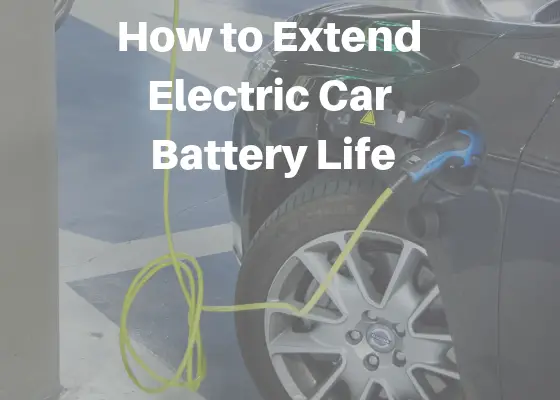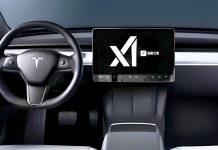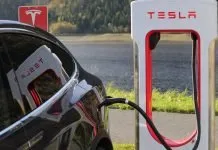The most important part of the electric vehicle is the battery. Ever since electric vehicles first hit the market way back in Victorian times, People worried about the lifespan of the battery. Nowadays most of the modern electric vehicle batteries have a long life. When the battery is charged and discharged over time, it will suffer from something called battery degradation. There are subtle changes in the molecular level that affect the battery’s ability to hold the charge. These changes are irreversible and result in the gradual loss in range.
Table of Contents
How to Extend Electric Car Battery Life

Avoid Charging in Hot Weather
First up, try and avoid charging your electric vehicle when the weather is really hot or when the batteries are very hot. Particularly in the summer, those hot days when you’ve had a long run on the freeway, you should cool down your car before you whack it on the charger. If possible then charge your electric vehicle at the coolest time of day or night. Some cars have charge timer to make sure that the charging stops overnight when the temperatures are lowest so if you have that option make use of it.
If you’ve got a garage or shaded area to park the car keep that car in the shade, this is particularly important for cars without active thermal management. The modern EV’s batteries are way more heat resistant than even ones produced eight years ago but it’s still better to avoid cooking them.
Avoid Storing the Car Fully Charged for Long Period of Time and Avoid Overcharging it
Ideally, you want to charge to around 95 percent most of the time unless you’re wanting that extra 5% to go the extra miles. Lithium-ion batteries are subject to this really weird phenomenon where the lithium migrates onto the negative anode where it stays. Once it’s there, it forms a film and this irreversible film forming happens most at high levels of charge. This weird effect is partly responsible for the much faster loss of capacity seen on earlier Nissan Leaf batteries.
Various additives have been used to prevent these films forming but it’s a reduction of the effect, not its elimination so it’s better to keep your EV charged only most of the way if you don’t need that extra range. If you’re going on holiday charge it to just over half rather than all the way to fall.
Rapid Charging Effects
The rapid charge may break down films or crystals that are formed so frequent rapid charging will shorten the life of your battery. The charging itself is probably less of a problem than heat produced, forcing a lot of current into the batteries very quickly causes them to get hotter and as they get hotter the degradation speeds up so this affect the battery life. That’s two quickies out of the way- keep your car cool and only use rapid charging when it is really needed.
Don’t Keep your EV’s Battery Empty
Pulling batteries all the way down to empty is not good for the Lithium-ion batteries. When lithium batteries are discharged the anode can dissolve into the electrolyte and when you attempt to recharge the battery these atoms form dendrites and these can cause short circuits and reduce the capacity of the battery. Try and avoid those deep discharges and if you do whack the car on the charger as soon as possible to avoid it sitting with a discharged battery.
Every time Don’t push your car to its limit
who doesn’t love the wine as you floor the accelerator in an EV, everyone love that smooth feeling of infinite torque except of course the battery. Batteries sadly have internal resistance, that resistance is pretty low in healthy battery but it’s still there. Drawing current from a battery produces heat and drawing a lot of current produces a lot of heat that means early battery death.
If you have any queries regarding this post, let us know in the comment section below.
FAQs
How Do I Keep My Electric Car Battery Healthy?
To keep your electric car battery healthy, it is recommended to maintain appropriate charge levels by avoiding frequent full charges or extreme low levels. Extreme temperatures should also be avoided, as both excessive heat and cold can impact battery performance. Regularly charging your vehicle and avoiding long periods of inactivity helps to keep the battery in good condition.
Additionally, following the manufacturer’s guidelines for charging and storage, and ensuring a well-maintained cooling system, can contribute to the longevity and health of your electric car battery.
What Is the Price of Electric Car Battery?
The price of an electric car battery can vary depending on several factors, such as the specific make and model of the vehicle, the battery capacity (measured in kilowatt-hours or kWh), and the manufacturer’s pricing structure. Electric car battery prices were generally falling, with estimates ranging from around $150 to $200 per kWh. This means that a typical electric car battery pack with a capacity of, for example, 60 kWh could cost between $9,000 and $12,000. However, it’s important to note that battery prices are subject to change over time due to technological advancements, economies of scale, and other factors affecting production costs.
Will Charging My EV to 100% Really Damage the Battery?
Charging an electric vehicle (EV) to 100% capacity occasionally is generally not harmful to the battery. Most modern EVs have built-in battery management systems that help protect the battery from overcharging. However, continuously charging your EV to 100% or regularly discharging it to extremely low levels can have a slight impact on the long-term health and longevity of the battery.
Lithium-ion batteries, commonly used in EVs, have an optimal charging range for longevity, typically around 20% to 80% of the battery’s capacity. Staying within this range is recommended for everyday use to help maximize the battery’s lifespan. Charging to 100% or discharging to extremely low levels occasionally is generally fine, but it’s best to avoid making it a regular practice.
It’s important to consult the manufacturer’s guidelines and recommendations specific to your EV model, as they may provide more detailed information on the ideal charging practices and strategies to ensure the longevity and health of the battery.
What Are the Disadvantages of EV Battery?
The disadvantages of EV batteries include limited driving range compared to traditional vehicles, longer charging times compared to refueling with gasoline, and the potential for reduced battery performance in extreme temperatures. Additionally, the cost of EV batteries is still relatively high, although it has been decreasing. The availability of charging infrastructure and concerns about the environmental impact of battery production and disposal are other considerations. However, these challenges are being addressed through ongoing technological advancements and the expansion of charging networks.



















My friend runs his 30kWh LEAF frequently down to the turtle and then uses the Fast Charger. He also has more fast charges on the counter than standard charges. He is driving fairly moderate. He has more than 75.000 miles on the clock and all 12 segments and still good range. So?
Confusing. I understood best to charge when cool. Then you state use timer to not charge when cool. “cars have charge timer to make sure that the charging stops overnight when the temperatures are lowest so if you have that option make use of it”